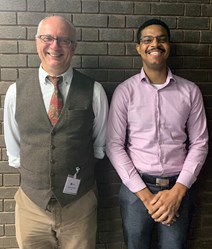Author and interviewer: Stefan Linton, ENT Registrar, Manchester Royal Infirmary.
 We caught up with Mark Watson, President of the British Laryngology Association, to find out his thoughts on the BLA’s position statement on the use of Gardasil vaccination in the treatment of laryngeal papillomatosis.
We caught up with Mark Watson, President of the British Laryngology Association, to find out his thoughts on the BLA’s position statement on the use of Gardasil vaccination in the treatment of laryngeal papillomatosis.
(Image: Mark Watson and Stefan Linton)
Can you tell us a little about your association with the BLA?
I’ve been a laryngologist since I was appointed as a consultant in 1992. During that time, I started one of the first voice clinics in the UK and have been very active in the field ever since. I was one of the founding members of the association during its establishment in 2012 and I feel very privileged to be the first President elected from a District General Hospital background.
How did the BLA’s position statement come about?
We feel that the Gardasil vaccination should be offered to virtually all patients with laryngeal papillomatosis. As the vaccine is licensed for patients over nine years, it should be offered as an adjunct to surgical debulking. There is very good evidence that shows the vaccine reduces the frequency and severity of recurrence. Apart from surgery, it is the only other effective treatment we have for the condition. Other therapies such as antiviral or cytotoxic drugs have been used in other places but are not popular in the UK. Their use is only reserved for severe cases in patients with frequent recurrence, especially in children when recurrence affects the airway. There has always been a cloud hanging over them regarding their oncogenic potential that could lead to laryngeal cancer. The vaccination is safe, it has been used in the national programme of vaccinating girls with very little in the way of significant side effects. The BLA is one of the organisations that has been campaigning for years to get boys included in the Gardasil vaccination scheme nationally. So as of this month, twelve-year-old boys will now be offered the vaccine in schools alongside girls. It’s been difficult to get CCGs and Primary Care to fund it because it’s expensive. One vaccine cost around £350, with adults requiring three doses, children requiring two.
How do you think the vaccine will affect the incidence of HPV related disease in the next 20 years?
It’s a bit too early at the moment to tell. We are now seeing a reduction in the incidence of cervical dysplasia. This will then have a knock-on effect on the incidence of cervical carcinoma. We do not know as yet how complete that control of cervical carcinoma will be, but things are looking promising from cervical screening programmes. It may likely take up to 20 years before we are seeing the vaccination’s effect on the incidence of HPV related oropharyngeal carcinoma.
For those trainees interested in pursuing a career in laryngology, what advice would you give to them?
Find your local laryngologist and tag along! Laryngology is now for more than managing a voice clinic, voice is just a third of what we do. Dysphagia is a rapidly growing part of our workload, particularly with the ageing population. Most of us now have access to a transnasal oesophagoscope, so are branching out into this field, working closely with our upper gastrointestinal GI colleagues. Thirdly, there is the airway aspect which keeps us in business quite a lot these days. So, laryngology is now: voice, dysphagia and airway.
Read the official position statement from the BLA.
Read the report from the BLA Cutting Edge Laryngology Conference by Natalie Watson.



